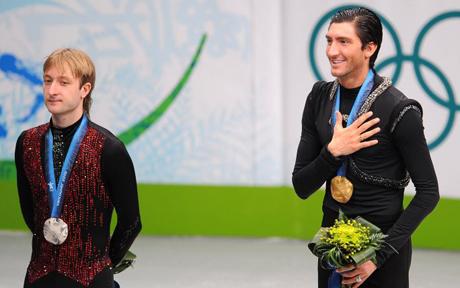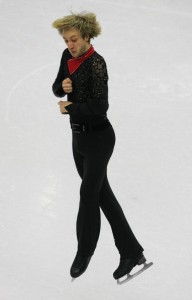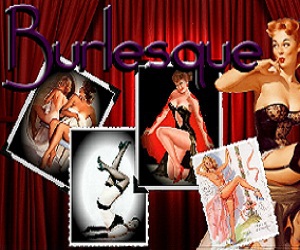
Man is condemned to be free; because once thrown into
the world, he is responsible for everything he does.
—Jean-Paul Sartre
I.
“Let’s build a stadium,” someone said.
“Let’s fill the bottom of the stadium with ice,” said another. “And let’s fill the stands with people.” Everyone nodded.
“We could affix metal blades to a pair of shoes,” someone said. “We could put these shoes on a person!” another added. “We could have them slide around on the ice wearing these bladed shoes!” added a third. “Let’s call them ‘skaters’ and the shoes ‘skates.’” Everyone concurred.
“Let’s name every twist and turn they make while sliding around.” Then another asked, “Like ‘triple axel’ and ‘double lutz?’” “Uh huh!” “We could import people from all over the world to assign numerical scores to what this person does on the ice in this stadium.” “We’ll add the scores together!” one proclaimed, while another piped in, “We’ll declare a winner!” Everyone pondered. “We’ll give them gold, bronze or silver!” Everyone nodded and agreed.
~
Many years before, there was different conversation:
“Do ya’ll like sounds?” one asked the others, banging one rock against the cave wall. “Yes, we like the sounds if the sounds go well together.”
“Let’s make instruments designed to emit different kinds of sounds and put those sounds together.” “Yes,” said another. “Ok,” said another. “I will make the instruments.”
One went off by himself for a few hours and made the instruments. When he came back, he distributed them to the others. They began to play the instruments. But when they played, the sounds didn’t go together.
One, the palest and thinnest of them, said, “Someone needs to make a plan that makes the sounds go together.” He went off by himself for many hours, and he came back with a plan that made the sounds go together.
Then someone invented a way of recording the sounds. Then someone invented a way of projecting the sounds. Then it was decided that the man with ‘skates’ would perform motions like ‘triple axels’ and ‘double lutzes’ to the ‘music’ that was projected into the stadium where everyone watched him.
II.

Evgeni Plushenko of Russia (Photo by Clive Rose/Getty Images)
At the Olympic awards ceremony for the men’s free skate, Evgeni Plushenko of Russia, silver medalist winner, was announced to a stadium full of applause. When he glided his way over to the three-tiered podium where the top three men in free skating—gold medal winner Evan Lysacek of the U.S., Plushenko of Russia, and bronze medal winner Daisuke Takahashi of Japan—would stand to receive their medals, Plushenko jokingly stepped up on the gold medal platform and got some laughs from the crowd before allowing Lysacek to claim the spot.
Behind this joke, though, lies real disagreement about who deserved the gold. According to Reuters, the decision to award it to Lysacek was extremely controversial considering that Plushenko performed the highly demanding quad jump, the most difficult maneuver in figure skating, while Lysacek did not. Pleshenko told Russian media, “You can’t be considered a true men’s champion without a quad.” Plushenko was not alone in his opinion. Vladimir Putin personally wrote to Pleshenko, “I would like to sincerely congratulate you on the wonderful Olympic performance—your silver is worth gold.”
Pleshenko was visibly upset during the ceremony as the United States’ national anthem played. Who’s to say that he skated 1.31 points less well than Lysacek? Can anything that humans create—the art and the methodology for assessing that art—be fair?
III.
“How can we know the dancer from the dance?” writes W.B. Yeats, and, of course, we can’t. The dance cannot exist without the dancer. The skating cannot exist without the skater. The music cannot exist without the composer. The writing cannot exist without the writer. And yet, just as there is no absolute perfection in the arts, but only the idea and the hope of perfection, there is no perfect way of assessing the arts. There isn’t an objective record there is in racing—it takes this person this amount of time to skate this distance.
Immense human effort goes into producing and accommodating certain arts and yet there is no intrinsic practical value in art. And if there are standards applied to assessing art, they are artificial standards created by human beings, who are flawed, capricious, and often hungry for absolutes where absolutes cannot exist.
W.H. Auden writes, “Art makes nothing happen.” Still, we create art and assess art, even though it doesn’t bring us food, doesn’t shelter us, and doesn’t bring peace. And on Thursday, February 18, 2010, millions of people watched a few people put on skates and dance around on ice to music, something that doesn’t actually have any intrinsic value except that it can be seen and enjoyed.
Enda St. Vincent Millay writes, “Love is not all: it is not meat nor drink / Nor slumber nor a roof against the rain… / I might be driven to sell your love for peace, / Or trade the memory of this night for food. / It well may be. I do not think I would.”
Art, like love, has the potential to bring us immeasurable pleasure we could never have imagined. It’s just like Harry—of When Harry Met Sally—says: “Had my dream again where I’m making love, and the Olympic judges are watching. I’d nailed the compulsories, so this is it, the finals. I got a 9.8 from the Canadians, a perfect 10 from the Americans, and my mother, disguised as an East German judge, gave me a 5.6. Must have been the dismount.”








{ 0 comments… add one now }